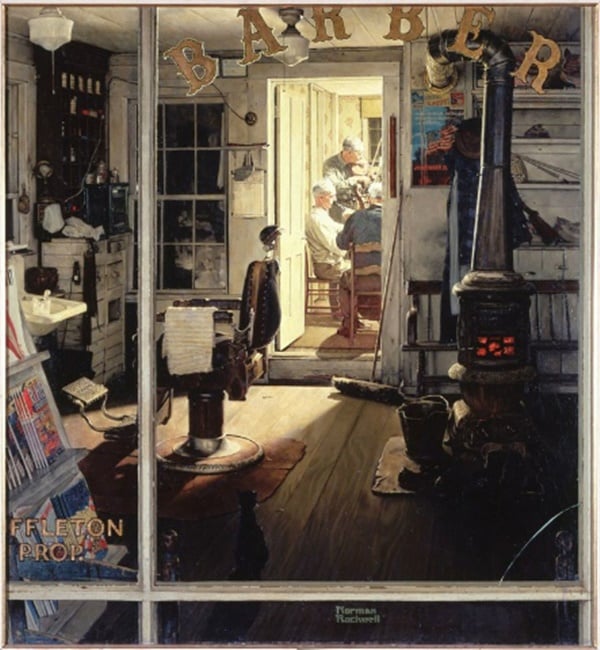Law & Politics
Judge Rules That Berkshire Museum Can Move Forward With Planned Sotheby’s Sale
The judgment is a blow to opponents of next week's auction.
The judgment is a blow to opponents of next week's auction.
Eileen Kinsella

In a blow to opponents of the Berkshire Museum’s planned multimillion-dollar art sale at Sotheby’s next week, a judge in Berkshire, Massachusetts has denied a request for a temporary restraining order to delay the auction of works from the museum’s collection.
The first sale of a group of roughly 40 works from the Berkshire Museum’s collection—including the star lot, Norman Rockwell’s Shuffleton Barbershop (1956), estimated at $20–30 million—is scheduled to take place on Monday, November 13. The case has ignited a national debate over deaccessioning and divided the museum world.

Norman Rockwell, Shuffleton’s Barbershop (1959). Courtesy Berkshire Fine Arts.
Judge John Agostini denied a request for a temporary restraining order by two sets of plaintiffs, including three of Rockwell’s sons and several museum members, finding that they lacked standing to bring a suit.
Agostini also had strong words for Massachusetts Attorney General Maura Healey’s office, opining that the office waited too long—four months—to take action against the planned sale after initially learning about it this past summer. In the ruling, the judge said the fact that the attorney general was concerned about the sale and claimed the office needed more time to investigate its legality did not reach a high enough standard to justify stepping in and blocking the auction.
Agostini wrote that his decision hinged on two criteria: whether the original plaintiffs have standing to make their claims and whether the attorney general’s office, which last week asked to become a plaintiff in the suit if the judge determined that those suing failed to meet the proper standard, satisfied the requirements for a preliminary injunction.
Michael B. Keating, of the law firm Foley Hoag, who represents the first set of plaintiffs to bring suit—the group that includes Rockwell’s sons—said his clients are disappointed. They and other Berkshire County residents “will no longer have an opportunity to see this treasured art. We are especially disappointed on behalf of the Rockwell family whose father was promised his paintings would always remain home and be shown in Berkshire County. The sale of these artworks represents a huge loss to the community.”
Nicholas O’Donnell, an attorney who brought the second case against the Berkshire Museum on behalf of several museum members, told artnet News via email: “My clients had certainly hoped for a different outcome, but we are reviewing the decision and considering my clients’ options.”
A representative for the attorney general’s office told artnet News that they are also reviewing Judge Agostini’s order.
The Association of Art Museum Directors and American Alliance of Museums, two leading professional organizations, released a joint statement expressing their own disappointment with the judge’s decision: “Our organizations remain deeply concerned that the Trustees of the Berkshire Museum are considering deaccessioning works from their collection to support operating expenses and fund an endowment.”
Proponents of the sale were, on the other hand, predictably pleased with the judge’s decision. “We believe we acted consistent with our responsibility to this community and our collections, to keep this museum open now and strengthen it for generations to come,” Elizabeth McGraw, president of the museum’s board of trustees, said in an emailed statement. “We are grateful the Judge recognized the care and diligence the Board exercised in arriving at this decision.”
The museum’s legal counsel, Wilmer Hale, said the judge’s “thorough and thoughtful decision recognizes the Berkshire Museum took great care to make sure this important resource can continue to serve the community for generations to come.”
A representative for Sotheby’s said the auction house is “very pleased that the court reaffirmed that the Board of Trustees acted in good faith and fulfilled its fiduciary duties. We are looking forward to successful auctions beginning next week that will ensure a bright future for the Berkshire Museum.”
In concluding his opinion, Judge Agostini acknowledged the emotional complexity of the issue while underscoring his responsibility to consider only the legal merits of the case:
This may very well mean that timeless works by an iconic, local artist will be lost to the public in less than a week’s time. No doubt many will be disappointed in this outcome, and they may take little comfort knowing that, in their loss, the rights of a charitable board to make thoughtful decisions to steer its charity through troubled times have been vindicated. However, it is the responsibility of the court to act dispassionately and decide cases solely on the legal merits of the claims presented.